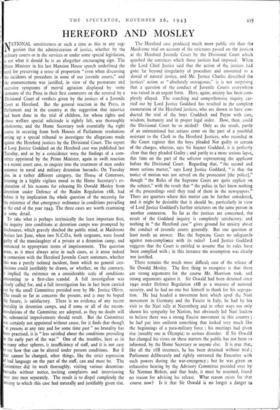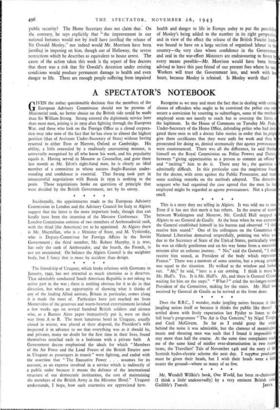HEREFORD AND MOSLEY
NATIONAL sensitiveness at such a time as this to any sug- gestion that the administration of justice, whether by the ordinary courts or in the services or under some- special legislation, Is not what it should be is an altogether encouraging sign. The Prime Minister in his last Mansion House speech underlined the need for preserving a sense of proportion " even when discussing the incidents of procedure in some of our juvenile courts," and the announcement was justified, in view of the premature and excessive symptoms of mental agitation displayed by some elements of the Press in their first comments on the reversal by a Divisional Court of verdicts given by the justices of a Juvenile Court at Hereford. But the general reaction in the Press, in Parliament and in the country at the suggestion that injustice had been done in the trial of children, for whose rights and whose welfare special solicitude is rightly felt, was thoroughly wholesome, and the Home Secretary took essentially the right course in securing from both Houses of Parliament resolutions setting up a special tribunal to investigate the allegations made against the Hereford justices by the Divisional Court. The report of Lord Justice Goddard on the Hereford case was published last Tuesday, and so by a coincidence were the findings of a com- mittee appointed by the Prime Minister, again in swift reaction to a recent court case, to enquire into the treatment of men under sentence in naval and military detention barracks. On Tuesday also, in a rather different category, the House of Commons, listening in a highly vigilant mood to the Home Secretary's ex- planation of his reasons for releasing Sir Oswald Mosley from detention under Defence of the Realm Regulation 18B, had before it by implication the whole question of the necessity for the existence of that emergency ordinance in conditions prevailing at the end of the year 1943. The three cases are worth examining n some detail.
To take what is perhaps intrinsically the least important first, the inquiry into conditions at detention camps was prompted by disclosures, which gravely shocked the public mind, at Maidstone Assizes last June, when two N.C.O.s, both sergeants, were found guilty of the manslaughter of a private at a detention camp, and sentenced to appropriate terms of imprisonment. The question arose, as it must always arise in such cases, as it arose indeed in connexion with the Hereford Juvenile Court sentences, whether this was a purely isolated incident, from which no general con- lusions could justifiably be drawn, or whether, on the contrary, t implied the existence on a considerable scale of conditions mounting to a first-class scandal. A full investigation was learly called for, and a full investigation has in fact been carried ut by the small Committee presided over by Mr. Justice Oliver. he result so far as concerns the present, and it may be hoped the future, is satisfactory. There is no evidence of any recent brutality in detention camps, and if some or all of the recom- mendations of the Committee are adopted, as they no doubt will be, substantial improvements should result. But the Committee 'as certainly not appointed without cause, for it finds that though at present at any rate and for some time past " no brutality has en practised, it is " less satisfied about the conditions prevailing the early part of the war." One of the troubles, here as in o many other spheres, is insufficiency of staff, and it is not easy o see how that can be altered under present conditions. But if at cannot be changed, other things, like the strict repression bad language on the part of the staff, can and must be. The mmittee did its work thoroughly, visiting various detention- arracks without notice, inviting complaints and interviewing over 200 men separately. The result is to dispel completely the anxiety to which this case had naturally and justifiably given rise. The Hereford case produced much more public stir than the Maidstone trial on account of the strictures passed on the justices at the Hereford Juvenile Court by the Divisional Court which quashed the sentences which those justices had imposed. When the Lord Chief Justice said that the action of the justices had gone far beyond irregularity of procedure and amounted to a denial of natural justice, and Mr. Justice Charles described the justices' action as " absolutely outrageous," it is not surprising that a question of the conduct of Juvenile Courts everywhere was raised in an urgent form. Here, again, anxiety has been com- pletely allayed. The searching and comprehensive inquiry car- ried out by Lord Justice Goddard has resulted in the complete exoneration of the Hereford justices, who are shown to have con- ducted the trial of the boys Craddock and Payne with care, wisdom, humanity and in proper legal order. How, then, could the Divisional Court be so misled? Only as the result, partly of an unintentional but serious error on the part of a youthful assistant to the Clerk to the Hereford Justices, who recorded in the Court register that the boys pleaded Not guilty to certain of the charges, whereas, says Sir Rayner Goddard, it is perfectly clear that they pleaded Guilty ; and partly to a more serious lapse, this time on the part of the solicitor representing the applicant before the Divisional Court. Regarding that, " the second and more serious matter," says Lord Justice Goddard, " is that the notice of motion was not served on the prosecutor [the police]," though " the Rules of the Supreme Court are quite explicit on the subject," with the result that " the police in fact knew nothing of the proceedings until they read of them in the newspapers." There are quarters where this matter can be further considered, and it might be desirable that it should be, particularly in view of Lord Justice Goddard's further strictures on the same person in another connexion. So far as the justices are concerned, the result of the Goddard inquiry is completely satisfactory, and nothing in " the Hereford case " gives ground for anxiety about the conduct of juvenile courts generally. But one question at least needs an answer. Has the Supreme Court no safeguards against non-compliance with its rules? Lord Justice Goddard suggests that the Court is entitled to assume that its rules have been complied with ; in this instance the assumption was clearly not justified.
There remains the much more difficult case of the release of Sir Oswald Mosley. The first thing to recognise is that there are strong arguments for the course Mr. Morrison took, and strong arguments against it. Sir Oswald had been detained since 1940 under Defence Regulation 18B as a measure of national security, and he had no one but himself to thank for his segrega- tion. He had headed a movement here which aped the Nazi movement in Germany and the Fascist in Italy, he had by his visit to the Nazi rally at Nuremberg and in other ways not only shown his sympathy for Nazism, but obviously led Nazi leaders to believe there was a strong Fascist movement in this country ; he had put into uniform something that looked very much like the beginnings of a para-military force ; his meetings had given rise (notably one at Olympia) to serious disorder. If Sir Oswald has changed his views on these matters the public has not been so informed, by the Home Secretary or anyone else. It is true that, like all the 18B internees, he has been detained without trial ; Parliament deliberately and rightly entrusted the Executive with such powers during the war-emergency ; but he was given an exhaustive hearing by the Advisory Committee presided over by Sir Norman Birkett, and that body, it must be assumed, found no reason for advising his release. What reason exists for that course now? Is it that Sir Oswald is no longer a danger to public security? The Home Secretary does not claim that. On the contrary, he says explicitly that " the improvement in our national fortunes would not by itself have justified the release of Sir Oswald Mosley," nor indeed would Mr. Morrison have been justified in imposing on him, though out of Holloway, the severe restrictions which he describes as equivalent to house arrest. The cause of the action taken this week is the report of five doctors that there was a risk that Sir Oswald's detention -under existing conditions would produce permanent damage to health and even danger to life. There are enough people suffering from impaired health and danger to life in Europe today to put the possibih of Mosley's being added to the number in its right perspectiv and in view of the effect the release of the British Fascist lead was bound to have on a large section of organised labour in th country—the very class whose confidence in the Governmen and zeal in the war-effort Ministers are endeavouring to foster b every means possible—Mr. Morrison would have been bett advised to leave' this past friend of our present foes where he was Workers will trust the Government less, and work with heart, because Mosley is releised. Is Mosley worth that?



























 Previous page
Previous page